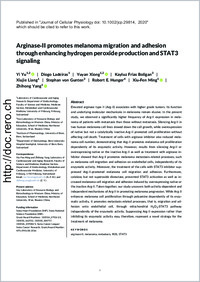Arginase‐II promotes melanoma migration and adhesion through enhancing hydrogen peroxide production and STAT3 signaling
- Yu, Yi Laboratory of Cardiovascular and Aging Research, Department of Endocrinology, Faculty of Science and Medicine, Medicine Section, Metabolism and Cardiovascular Medicine, University of Fribourg, Fribourg Switzerland - Key Laboratory of Resource Biology and Biotechnology in Western China, Ministry of Education, School of Medicine, Northwest University, Xi'an Shaanxi China
- Ladeiras, Diogo Laboratory of Cardiovascular and Aging Research, Department of Endocrinology, Faculty of Science and Medicine, Medicine Section, Metabolism and Cardiovascular Medicine, University of Fribourg, Fribourg Switzerland
- Xiong, Yuyan Laboratory of Cardiovascular and Aging Research, Department of Endocrinology, Faculty of Science and Medicine, Medicine Section, Metabolism and Cardiovascular Medicine, University of Fribourg, Fribourg Switzerland - Key Laboratory of Resource Biology and Biotechnology in Western China, Ministry of Education, School of Medicine, Northwest University, Xi'an Shaanxi China
- Boligan, Kayluz Frias Institute of Pharmacology, University of Bern, Bern Switzerland
- Liang, Xiujie Laboratory of Cardiovascular and Aging Research, Department of Endocrinology, Faculty of Science and Medicine, Medicine Section, Metabolism and Cardiovascular Medicine, University of Fribourg, Fribourg Switzerland
- Gunten, Stephan Institute of Pharmacology, University of Bern, Bern Switzerland
- Hunger, Robert E. Department of Dermatology, Bern University Hospital Inselspital, University of Bern, Bern Switzerland
- Ming, Xiu‐Fen Laboratory of Cardiovascular and Aging Research, Department of Endocrinology, Faculty of Science and Medicine, Medicine Section, Metabolism and Cardiovascular Medicine, University of Fribourg, Fribourg Switzerland
- Yang, Zhihong Laboratory of Cardiovascular and Aging Research, Department of Endocrinology, Faculty of Science and Medicine, Medicine Section, Metabolism and Cardiovascular Medicine, University of Fribourg, Fribourg Switzerland
-
29.05.2020
Published in:
- Journal of Cellular Physiology. - 2020, p. jcp.29814
English
Elevated arginase type II (Arg‐II) associates with higher grade tumors. Its function and underlying molecular mechanisms in melanoma remain elusive. In the present study, we observed a significantly higher frequency of Arg‐II expression in melanoma of patients with metastasis than those without metastasis. Silencing Arg‐II in two human melanoma cell lines slowed down the cell growth, while overexpression of native but not a catalytically inactive Arg‐II promoted cell proliferation without affecting cell death. Treatment of cells with arginase inhibitor also reduced melanoma cell number, demonstrating that Arg‐II promotes melanoma cell proliferation dependently of its enzymatic activity. However, results from silencing Arg‐II or overexpressing native or the inactive Arg‐II as well as treatment with arginase inhibitor showed that Arg‐II promotes melanoma metastasis‐related processes, such as melanoma cell migration and adhesion on endothelial cells, independently of its enzymatic activity. Moreover, the treatment of the cells with STAT3 inhibitor suppressed Arg‐II‐promoted melanoma cell migration and adhesion. Furthermore, catalase, but not superoxide dismutase, prevented STAT3 activation as well as increased melanoma cell migration and adhesion induced by overexpressing native or the inactive Arg‐II. Taken together, our study uncovers both activity‐dependent and independent mechanisms of Arg‐II in promoting melanoma progression. While Arg‐II enhances melanoma cell proliferation through polyamine dependently of its enzymatic activity, it promotes metastasis‐ related processes, that is, migration and adhesion onto endothelial cell, through mitochondrial H2O2‐STAT3 pathway independently of the enzymatic activity. Suppressing Arg‐II expression rather than inhibiting its enzymatic activity may, therefore, represent a novel strategy for the treatment of melanoma.
- Faculty
- Faculté des sciences et de médecine
- Department
- Département de Médecine
- Language
-
- English
- Classification
- Biological sciences
- License
-
License undefined
- Identifiers
-
- RERO DOC 328630
- DOI 10.1002/jcp.29814
- Persistent URL
- https://folia.unifr.ch/unifr/documents/308749
Statistics
Document views: 131
File downloads:
- pdf: 428
